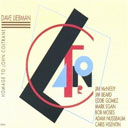Never-before-heard live recordings of John Coltrane and Eric Dolphy have been discovered in the New York Public Library and will be released for the first time next month, more than 60 years after they were made.
The audio, which dates back to Coltrane’s 1961 residency at New York’s Village Gate, was recorded as part of a test of the club’s new sound system.
The recordings came into the possession of the New York Public Library for the Performing Arts, where it was lost. Though the tapes were briefly rediscovered, they disappeared again in the Library’s archives for several more decades.
Now they have finally come to light, the recordings have been compiled into Evenings at the Village Gate, a forthcoming release on 14 July by Impulse Records, which has released Coltrane’s work since the 1960s.
Across 80 minutes, the album features classic Coltrane numbers including My Favorite Things, Impressions and Greensleeves, as well as When Lights Are Low and Africa. The tracks were performed by Coltrane alongside pianist McCoy Tyner, bassist Reggie Workman, drummer Elvin Jones and saxophonist Dolphy.
The performance took place just three years before Dolphy died aged 36, meaning the archive material is a special insight into his and Coltrane’s brief musical partnership, which encompassed the albums Olé Coltrane, Africa/Brass, Live! at the Village Vanguard and Impressions, released between 1961 and 1963. It is the only live recording of the group’s legendary Village Gate performances and it features the only known non-studio recording of Africa – extended to nearly 23 minutes.
Coltrane and Dolphy first met in Los Angeles, before becoming friends when the latter moved to New York in 1959.
Coming of age at the height of bebop, both were compelled to push the boundaries of jazz into freer territory, which made fertile ground for highly expressive collaboration. After many stints in Coltrane’s band, Dolphy was asked to become a permanent member in 1961 ahead of the Village Gate residency. The music from the now-acclaimed partnership was initially dubbed as “anti-jazz” by some critics.
“During 1961, John was following a different concept as far as his harmonic approach,” Workman writes in an essay accompanying the new release. “He was giving more room for the solos and coming from a different place in the way he was constructing his tunes … It was an exploratory time for John. He was always reaching for new sounds and Eric being in the group was part of that. John really respected Eric a lot. They were very close in concept. Listening to the recording from the Gate, you can hear how Eric would take long solos and John would come after him and take a much shorter solo than he would normally take and let Eric’s voice be prominent.”
“This music is right at the beginning of a major change for Coltrane,” saxophonist Branford Marsalis writes in another essay. “He was starting to stretch in a new direction. In terms of the intensity that’s traditionally associated with the classic Coltrane quartet, this is the precursor.”
That classic quartet comprised Coltrane, Tyner, Jones and bassist Jimmy Garrison, releasing classics including A Love Supreme. Coltrane would go on to explore even freer expression on albums such as Ascension. He died in 1967 aged 40, having led at least 50 recording sessions and collaborated with others including Miles Davis and Thelonious Monk. His legacy continues; he has received a collection of posthumous awards, including a special Pulitzer prize in 2007.
The Village Gate recordings are the latest lost Coltrane material to come to light. In 2018, an album of previously unreleased originals, Both Directions at Once, was described by Coltrane peer Sonny Rollins as “like finding a new room in the Great Pyramid”. It was followed by Blue World in 2019, a collection of unheard alternate versions of Coltrane tracks such as Naima and Traneing In.











